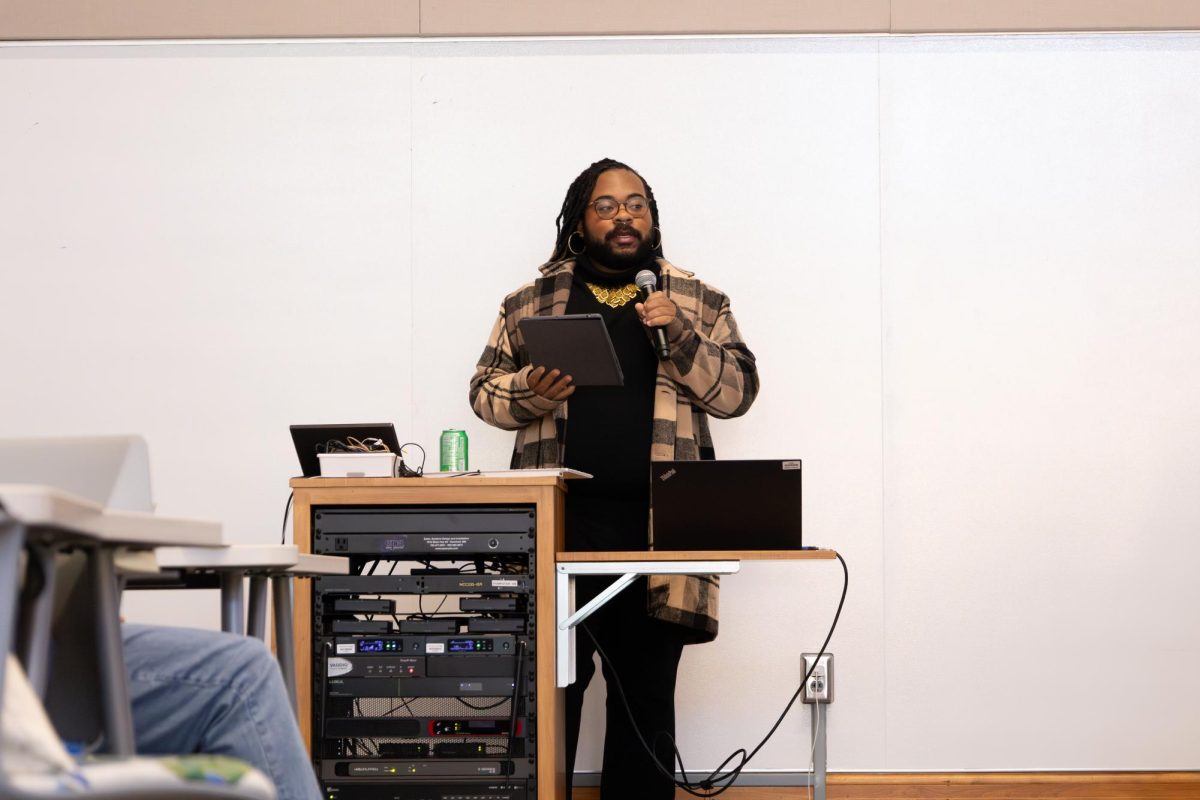The weekly convocation series at Carleton College is a shared campus experience that brings students, faculty, staff and Northfield residents together for an hour presentation from experts in a variety of fields. The primary goal of the series is to stimulate thought and conversation on a wide range of subjects. To accomplish this goal, the Committee on Convocation and Common Conversation meets termly to review and contact convocation suggestions submitted by students, faculty and staff.
We sat down with Kerry Raadt, Director of Events at Carleton College and member of the Committee on Convocation and Common Conversation, to learn more about the selection process, the purpose of convocation and the future of the weekly series.
Zoe Pharo: How would you describe the purpose of convocation at Carleton?
Kerry Raadt: The convocation program enhances the educational mission of the college by bringing in interesting and diverse outside speakers. Some people think that convocation has a community-building aspect to it because it’s an opportunity when there are no classes scheduled for the campus community to come together. I don’t know that it really serves that purpose because the audience is largely students. If we had a large contingent of faculty and staff also then I would say that it was.
ZP: What is it like to look out at a convocation crowd?
KR: The audience numbers 400 to 500 each week. If we get a celebrity-type speaker, you can get 900 to 1,000 people there, depending on who it is, but it’s primarily students, with a smattering of faculty and staff, and we have a fair number of retirees from the community that like to come every week. There are some real faithful ones that look at this as an opportunity for them to continue to learn, and Carleton makes this open to the community, so it’s nice to have folks from outside the campus join us too.
ZP: What does a typical committee meeting look like?
KR: The first meeting of the term is usually to lay some groundwork of what the committee will be doing during the year. What are some of the goals of the committee? The goals for the weekly program? And then follow-up meetings tend to be focused on actually talking about speaker suggestions.
We take a speaker and discuss the merits of the suggestion. Is this speaker going to present something to the campus that might be new? Would it be interesting? Would it be educational? Enlightening?
ZP: How do you think the committee has changed in recent years?
KR: I think in recent years, the committee has been much more engaged in the process. I can remember many years ago when the committee would basically want me or my predecessor to research and bring them ideas, and they would just rubber stamp what was already selected. In recent years, the committee has been much more engaged in taking the time and the effort to actually look at individual speakers and talk about their merits, which has produced a richer slate of speakers.
ZP: How do you decide on which speakers to contact? What criteria do you use in judging the speakers?
KR: The committee selects the ones who have broad appeal. If you brought in an economist to talk at a very high level about economic theory, it wouldn’t be of interest. It would have to be interesting and enlightening–something that either presents a new idea or looks at an existing idea with a new perspective. And we don’t want to have the same topic in two or three consecutive weeks, so there has to be a variety–you could get a journalist one week, an artist one week, a scientist the next week.
Each member of the committee has different opinions, so they pick their top choices. Then you see that certain speakers are rated highly by all members of the committee. Those that fall in the middle ground are the ones that we talk about–why some committee members would be in favor of them, while others think it’s not such a good idea.
ZP: Along the same lines, has there ever been an instance when you were really surprised by a speaker selected by the committee?
KR: More so in the past. I say that because now there are more opportunities, with the internet, to hear samples of a speaker’s presentation and to get feedback from other places where that person has spoken. In the early days, you could be surprised–we had a person who was an entrepreneur, he was the inventor of rollerblades and a variety of other things. He had a fascinating story, the things he was doing were fascinating, but when he spoke he was not a good public speaker, so the quality of the convocation was less than what we had hoped. But sometimes we’re surprised in a good way, that somebody is a much more dynamic speaker than we had thought, or their message comes across much more powerfully than we had thought. And the interesting thing too is, on any given week, someone will contact me and say “That was the best convocation I’ve ever heard,” and somebody will contact me the same week and say, “Boy, that one really missed the mark.”
ZP: Is there anything else you think would be interesting for the campus community to know?
KR: You know, even during the 23 years I’ve been here, convocation used to be the place to go to hear an outside perspective. Now, I could look at a bulletin board and see there are probably lectures going on tonight that would be fascinating. It’s not like convocation is the only place anymore. So if the main goal of convocation is to provide an educational, inspirational sort of experience for campus, maybe we’ll look at changing it up and say, “let’s just put all our eggs in one basket,” and bring in some high profile speakers who might shake things up.










